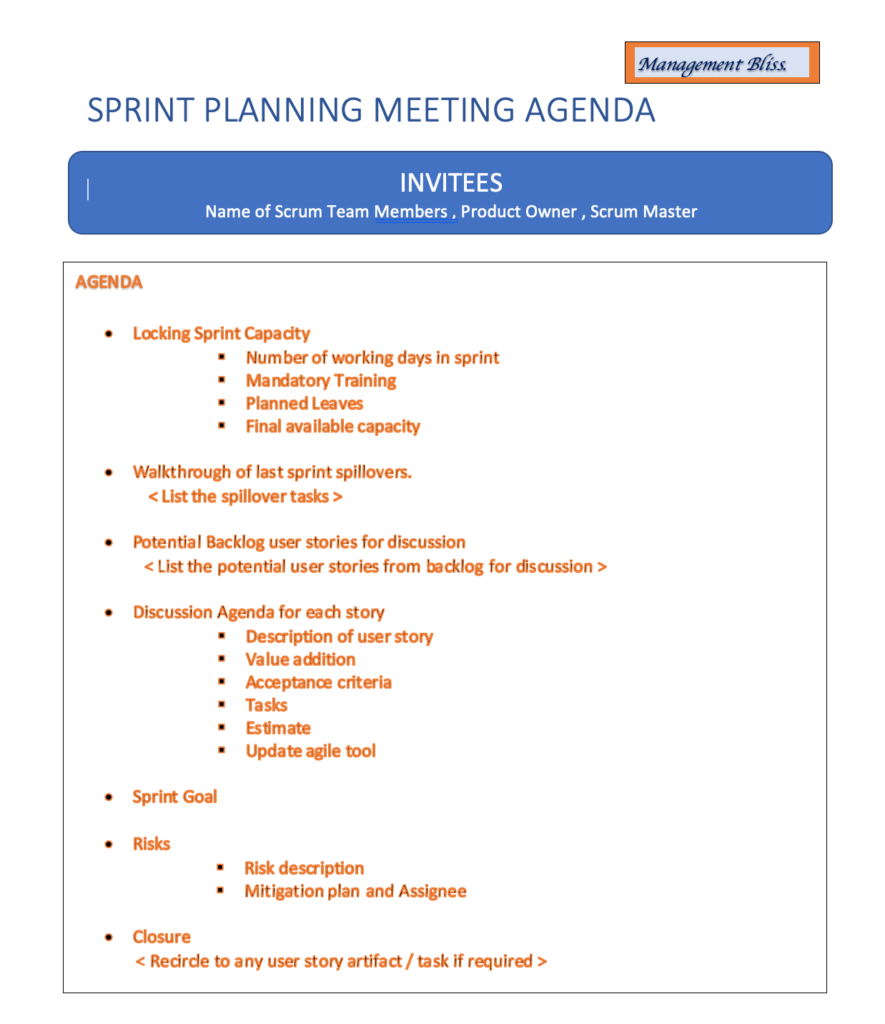This article talks more about sprint planning meeting concerning the agenda it should have.
There is a high chance that if we set a meeting without an agenda, we might lose focus, and are not that successful. Setting up a meeting agenda before the sprint planning meetings had saved me a lot of time and helped me ensure that we can discuss everything necessary in time and without going out of context.
“Sprint is time-boxed, and sprint planning should be to plan just what is required for a sprint.”
Agenda Structure #
Below agenda structure can be used to have an effective sprint planning meeting
- Discuss Sprint Capacity
- Look for holidays within the sprint.
- Find out the mandatory pieces of training for each team member.
- Work out how many hours do we need to reserve for regular meetings.
- Find out the planned leaves from the team.
- Finalize the available capacity for sprint work.
2**. Closure of Last Sprint**
- Have a walkthrough of what has not been completed in the previous sprint but just give only a few minutes as you already know enough about these stories.
- Decide if the spillovers need to go to sprint backlog for planning or product backlog.
3. User Stories
- You cannot discuss the entire backlog in one meeting, so get only the potential stories for discussion from your product backlog and publish it on the agenda so that the attendees can get any references handy if required.
4. Discussion Points for each user story
- Discussion on what the story is all about and its value for the end-user/ product.
- Verify the acceptance criteria are defined and meet your definition of ready. If not, then discuss the same to finalize it.
- Discuss what will be the tasks required to work on this story.
- Discuss who will be working on each task.
- Discuss the estimates for each story.
- Updated your agile tool with the tasks identified, assignee and estimates.
5. Sprint Goal
- Finalise your sprint goal with the team based on what you pulled in for this upcoming sprint, for example, “Deliver New Screen – for the Care Department.”
Pro Tip: Do not underestimate the importance of agreement on a sprint goal with the team as it sets up the team’s motivation to work for this sprint and adds value to your work.
6. Risk
- Discuss the possible risks that you anticipate.
- Draft the mitigation plans after discussion and add dates for follow-ups with assignees.
7. Confidence
- Wrap up your meeting after discussing the comfort level with each team member and do not hesitate asking them if there is anything they would like to re-visit before closure.
Sprint Planning Meeting Agenda Template #

sprint planning meeting agenda template
Feel free to use all or most of the above stated points, you can add some more depending on your work and organisation. I wish you all the very best for your next sprint planning.